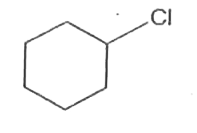The organic halide that does not under go any substitution reaction is




The correct Answer is:C
To determine which organic halide does not undergo substitution reactions, we need to analyze the nature of the halide and the structure of the compound.
1. Understanding Substitution Reactions:
- Substitution reactions involve the replacement of a leaving group (like a halide) by a nucleophile. For this to occur, the bond between the carbon and the leaving group must be able to break easily.
2. Identifying the Halides:
- We need to consider different types of organic halides. Common examples include alkyl halides (like alkyl chlorides, bromides, iodides) and aryl halides (like chlorobenzene).
3. Analyzing Aryl Halides:
- Aryl halides, particularly chlorobenzene, have a carbon-halogen bond that exhibits partial double bond character due to resonance. This means that the bond is stronger and more stable, making it less likely to undergo substitution reactions.
4. Resonance Effect:
- In chlorobenzene, the chlorine atom can participate in resonance with the aromatic ring. This resonance stabilizes the structure and increases the bond strength between the carbon and chlorine, making it difficult for the nucleophile to attack and for the chlorine to leave.
5. Comparing with Alkyl Halides:
- In contrast, alkyl halides do not have this resonance stabilization. Their carbon-halogen bonds are typically single bonds, which can break more easily, allowing for substitution reactions to occur.
6. Conclusion:
- Based on the analysis, chlorobenzene (an aryl halide) does not undergo substitution reactions due to the partial double bond character of the C-Cl bond, which makes it harder for the bond to break compared to other alkyl halides.
Final Answer:
The organic halide that does not undergo any substitution reaction is chlorobenzene.
- Substitution reactions involve the replacement of a leaving group (like a halide) by a nucleophile. For this to occur, the bond between the carbon and the leaving group must be able to break easily.
- We need to consider different types of organic halides. Common examples include alkyl halides (like alkyl chlorides, bromides, iodides) and aryl halides (like chlorobenzene).
- Aryl halides, particularly chlorobenzene, have a carbon-halogen bond that exhibits partial double bond character due to resonance. This means that the bond is stronger and more stable, making it less likely to undergo substitution reactions.
- In chlorobenzene, the chlorine atom can participate in resonance with the aromatic ring. This resonance stabilizes the structure and increases the bond strength between the carbon and chlorine, making it difficult for the nucleophile to attack and for the chlorine to leave.
- In contrast, alkyl halides do not have this resonance stabilization. Their carbon-halogen bonds are typically single bonds, which can break more easily, allowing for substitution reactions to occur.
- Based on the analysis, chlorobenzene (an aryl halide) does not undergo substitution reactions due to the partial double bond character of the C-Cl bond, which makes it harder for the bond to break compared to other alkyl halides.
The organic halide that does not undergo any substitution reaction is chlorobenzene.
Topper's Solved these Questions
- GENERAL ORGANIC CHEMISTRYBOOK - FIITJEECHAPTER - GENERAL ORGANIC CHEMISTRYEXERCISE - Section (II) [Jee mains]: With Single Correct Choice
78 Videos
- GENERAL ORGANIC CHEMISTRYBOOK - FIITJEECHAPTER - GENERAL ORGANIC CHEMISTRYEXERCISE - MORE THAN ONE CORRECT CHOICES
24 Videos
- GENERAL ORGANIC CHEMISTRYBOOK - FIITJEECHAPTER - GENERAL ORGANIC CHEMISTRYEXERCISE - SINGLE INTEGER ANSWER TYPE QUESTIONS
14 Videos
- GASEOUS STATEBOOK - FIITJEECHAPTER - GASEOUS STATEEXERCISE - MATCHING LIST TYPE QUESTION
1 Videos
- HYDROCARBONSBOOK - FIITJEECHAPTER - HYDROCARBONSEXERCISE - SINGLE INTEGER ANSWER TYPE QUESTION
9 Videos
Similar Questions
Knowledge Check
With which one of the following reagents benzene does not undergo substitution reaction
AFuming sulphuric acidBNitration mixtureCChlorine in presence of lightDAcyl halide in presence of AlCl3Which of the following compounds does not undergo nucleophilic substitution reactions ?
AVinyl chlorideBEthyl bromideCBenzyl chlorideDIsopropyl chlorideAssertion: Aryl halides undergo nucleophilic substitution reactions with ease.
Reason:The carbon halogen bond in aryl halides has partial double bonds character.ABoth assertion and reason are correct statements, and reason is the correct explanation of the assertionBBoth assertion and reason are correct statements, but reason is not the correct explanation of the assertionCAssertion is correct, but reason is wrong statement.DAssertion is wrong, but reason is correct statement.
